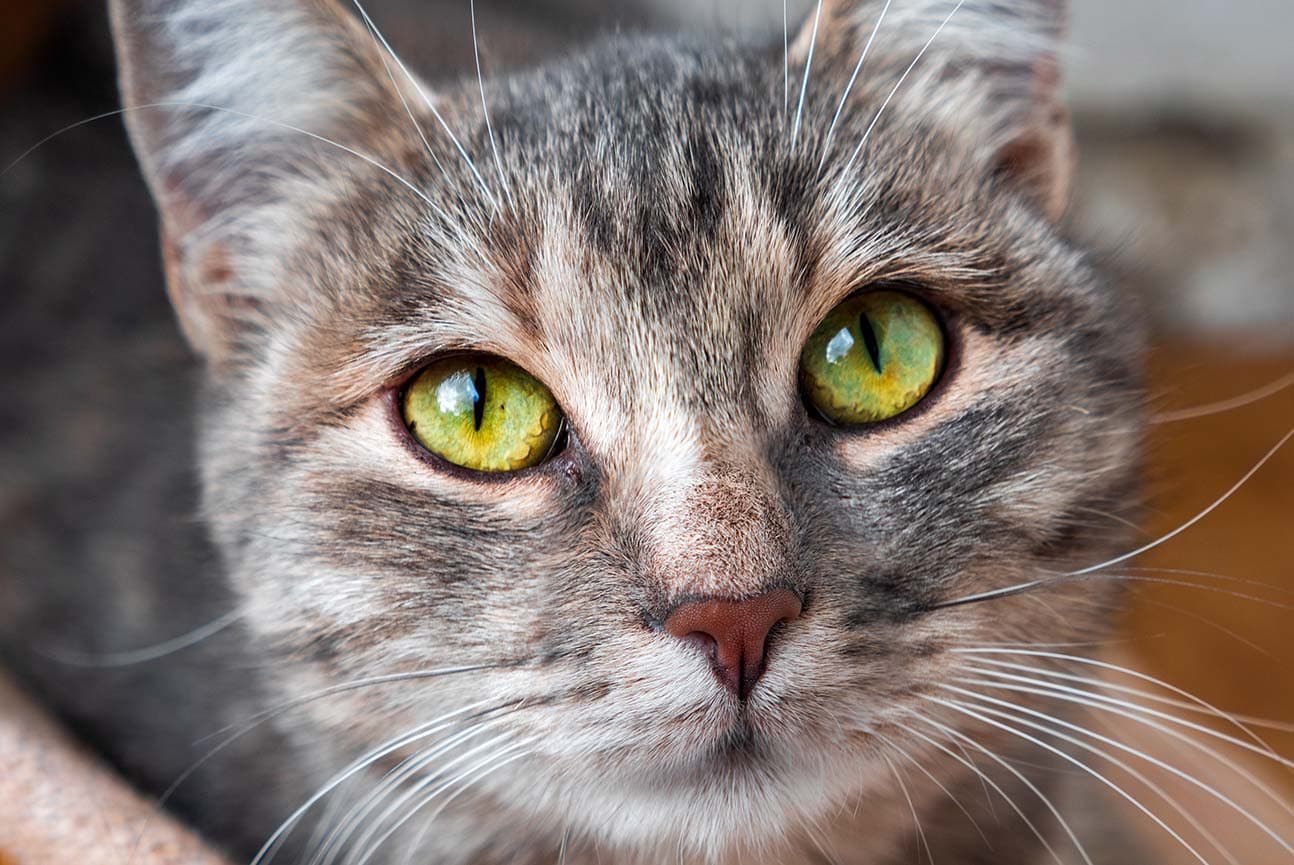Reviewed by Dr. Tetiana Filenko
Updated on 18/11/2025
Reading time 4 min.
Overview
Severity: Low
Life stage: All
Conjunctivitis is a common eye problem in cats, characterised by redness, swelling, and discharge. While it can affect any cat, it’s particularly common in young cats and kittens. Although most cases are mild and respond well to prompt treatment, untreated conjunctivitis can lead to pain, spread to other cats and may even indicate a more serious underlying illness.
In Dubai, conjunctivitis in cats is further complicated by heat, dust storms, seasonal allergens, and constant shifts between air-conditioned rooms and the outdoors. These factors irritate the eyes and trigger flare-ups, making early recognition and prompt veterinary care essential.
What is conjunctivitis in cats and what are the causes?
Conjunctivitis is redness and inflammation of the conjunctiva, the tissue that covers the inner surface of the eyelids and the white part of the eye (sclera). Both eyes are usually affected, but it can also sometimes affect just one.
Conjunctivitis is mostly caused by viruses and bacteria, particularly those associated with cat flu disease, such as Herpes virus, Calicivirus and Chlamydia. In Dubai’s environment, additional factors also contribute to the condition.
Common causes include:
- Eye ulcers from sand particles during shamal winds
- Trauma from outdoor activities
- Foreign objects, such as grass seeds or dust
- Parasites
- Immune-mediated diseases
- Viral illnesses: feline immunodeficiency virus (FIV), feline leukaemia virus (FeLV) or feline panleukopenia
- Allergies and environmental irritation: dust storms, air conditioning, chemicals or air fresheners
- Tear duct diseases and problems with tear production, aggravated by dry air
- Eyelid and eyelash problems
How to tell if your cat has conjunctivitis?
You might see some or all of the following symptoms in your cat:
- Discharge from the eye: may be clear, yellow, or green
- Pink or red eye
- Pawing or rubbing at the face
- Blinking more than usual or squinting
- Swelling of the tissue that lines the eyelids and surface of the eye (the conjunctiva)
- The third eyelid (a protective inner flap at the corner of the eye) becomes more pronounced
- Very watery eyes when moving between air-conditioned rooms and outdoor environments
- Crusty buildup around eyes
Are some cats more likely to get conjunctivitis?
Several factors increase risk, particularly relevant to Dubai’s environment:
Kittens: Usually more severely affected than adults because they find it harder to fight infections. However, the outcome is still very positive unless the kitten presents with more severe cat flu symptoms.
Cats with weakened immune systems: Cats with immune-mediated diseases or systemic infections may struggle more with symptoms or may suffer from frequent flare-ups.
Stress factors: Dubai’s busy lifestyle and environmental stress (visitors, noise) can trigger relapses of infectious conjunctivitis in susceptible cats.
Flat-faced cat breeds: Brachycephalic breeds such as Persian, Himalayan, and Exotic short-hair have a higher risk because they’re more likely to have eyelid and tear duct abnormalities. Their prominent eyes are also more exposed to wind-borne irritants.
High population density environments: Multi-cat households and shelters see more conjunctivitis due to infectious causes.
Dubai-specific risks:
- Cats spending time outdoors during dust storms
- Pets with existing allergies to regional pollen
- Indoor cats exposed to constantly-recycled air conditioning
Is conjunctivitis in cats contagious to humans?
Even though it’s very unlikely you will get conjunctivitis from your cat, you should always wash your hands after applying medications or touching your cat’s face during treatment. This is particularly important in Dubai’s close-contact indoor-living environment.
How is conjunctivitis diagnosed in cats?
Because there are many different causes of conjunctivitis, vets may need to use various tests to help confirm your cat’s diagnosis.
Initial examination:
- Eye check: The vet inspects your cat’s eyes and surrounding structures/skin.
- Detailed exam: Using a special light and magnifying tool (ophthalmoscope) to check deeper eye structures.
- Cornea test: Applying some drops of Fluorescein dye, which highlights scratches or damage on the eye’s surface.
- Checking tear production: A ‘Schirmer tear test’ measures tear production to detect dry eye.
- Checking pressure inside the eye: ‘Tonometry’ checks for glaucoma or other serious pressure-related issues.
Advanced diagnostics:
- Bacterial culture and sensitivity: Checking for bacterial infection and identifying the most effective antibiotic for targeted treatment
- Virus testing
- Cytology: Checking for abnormal cells
- Allergy testing: Recurrent or chronic (long-lasting) conjunctivitis may be associated with food and environmental allergies
- Blood samples: Occasionally necessary for persistent and complex cases
The vet may need to sedate your cat for thorough examination, especially if a foreign body is suspected.
What are the treatment options for conjunctivitis in cats?
Specific treatment depends on the underlying cause of conjunctivitis.
General treatment for mild conjunctivitis:
- Eye cleaners: Simple drops and wipes
- Medicated eye drops: Often contain antibiotic and anti-inflammatory ingredients
Prescription medicines depend on the underlying cause:
- Anti-viral oral medication
- Antibiotic oral medication
- Steroid anti-inflammatory medication
- Pain relief
Other treatments or surgery may be necessary for underlying conditions, such as glaucoma and eyelid problems.
Things you can do at home to help ease the symptoms of conjunctivitis in your cat
Once your cat has been seen by a vet, there are things you can do at home to help manage this recurrent problem.
Eye care: Cleanse the eye with a cotton ball soaked in saline solution 2-4 times daily. Clean accumulated discharge around the eye using a cotton pad. Sterile saline is available at many pharmacies, or you can make your own using cooled-down boiled water.
Protection: Use a buster (cone) collar to prevent your cat from making things worse by scratching at their eyes or rubbing their faces on furniture.
Environmental management:
- Keep indoor air filtered and humidified to counter dry air conditioning
- Keep your cat indoors during sandstorms
- Maintain regular grooming to keep debris away from eyes
Reduce stress:
- Keep your cat’s life as stress-free as possible. Stress can make certain illnesses worse or cause relapses.
Good hand hygiene between handling and medicating cats with infectious conjunctivitis is essential. And separating affected cats during illness helps prevent the spread of disease.
Is there any way to prevent conjunctivitis in cats?
In multi-cat households, conjunctivitis is less likely to spread if affected cats are separated during illness. Vaccinating your cat against cat flu helps to reduce the risk and severity of flu-related conjunctivitis (but not completely prevent it).
Dubai-specific measures:
- Cleanse eyes regularly to remove dust and debris
- Use air filtration systems to reduce allergens
- Acclimatise gradually to outdoor environments
- Schedule veterinary eye check-ups every 6-12 months
When do you need to call the vet if your cat has conjunctivitis?
Contact a vet immediately if your cat shows any of these signs:
- Severe sustained squinting
- Clear signs of pain: head pressing, intense pawing, vocalising
- Sudden vision changes: bumping into things
- A thick coloured discharge that rapidly gets worse
- Respiratory symptoms: including panting and wheezing/noisy breathing
- Develops worsening symptoms despite medication
If you’re not sure, it’s best to be safe and consult with a professional who understands the unique challenges of pet care in Dubai’s climate.
Worried about your cat’s red or runny eyes? Book a checkup or emergency appointment today at Modern Vet Hospital in Dubai. Their experienced team provides thorough diagnostic assessments, prompt treatment, and ongoing care tailored to your cat’s needs. From routine eye checks to urgent care for conjunctivitis, Modern Vet Hospital is your trusted veterinary clinic in Dubai for compassionate, expert feline care.
Share this, choose your platform!
Reviewed by
Dr. Tetiana Filenko
DVM
Dr. Tetiana was born and grow up in Ukraine. Throughout her life she always had pets and was always the one person in her family to look after them. At childhood she was helping stray animals in her spare time, this determined her choice of university and her decision to further her career in the study of veterinary medicine.


